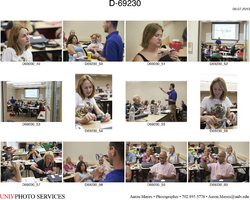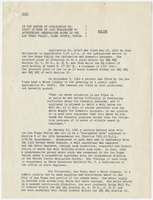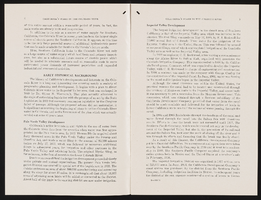Search the Special Collections and Archives Portal
Search Results



Cock of the Air, 1931 to 1932
Level of Description
Scope and Contents
The Cock of the Air sub-series (1931-1932) includes newspaper clippings, publicity stills, production and direction records, financial records, and legal records pertaining to the film’s production and release on January 23, 1932.
Newspaper clippings in the sub-series depict advertising campaigns for The Cock of the Air, theatrical releases, and film reviews. Publicity stills consist of the principal cast, supporting cast, and director on set, as well as posed images of the principal cast. Production and direction records feature production logs, screenplays, production still albums, and direction stills depicting the principal cast on film sets. Financial records for the sub-series include theatrical release contracts for England and purchase orders. Legal records contain contracts for the supporting cast and correspondence regarding censorship issues. Lastly, the story development records contain a synopsis, continuities, and shooting scripts.
Archival Collection
Pagination
- Previous page ‹‹
- Page 2
Archival Component
Miniature airplane models configured as World War I British and German fighters, approximately 1927 to 1930
Level of Description
Archival Collection
Pagination
- Previous page ‹‹
- Page 2
Archival Component
Antonio Morelli Papers
Identifier
Abstract
The Antonio Morelli Papers include materials spanning from the 1910s to the 1970s that chronicle the professional and private life of longtime Sands Hotel and Casino orchestra conductor and musical director, Antonio Morelli and his wife Helen. The collection includes snapshots from Morelli's early life, three scrapbooks, one box of sound recording tapes, and a box of slides from Thailand. The collection also documents Morelli’s efforts to provide classical music concerts for the Las Vegas, Nevada community and his involvement with the Guardian Angel Church on the Las Vegas Strip.
Archival Collection

Transcript of interview with Bruce L. Woodbury by Stefani Evans, September 27, 2016
Date
Archival Collection
Description
As Bruce Woodbury reflects on his twenty-eight years as Clark County's longest-serving County commissioner (1981–2009) he recalls serving with about thirty different commissioners. Surprisingly, "only seven of us got major jail sentences." He ruminates how Federal Bureau of Investigation probes Operation Yobo in the early 1980s and G Sting in the early 2000s exposed several Clark County politicians who succumbed to greed. While Woodbury considers honesty in office a given, his values were not held by all of his colleagues. One Operation Yobo recording caught a fellow commissioner responding to the query, "How about Woodbury?" with, "No, you can't touch him with a ten foot pole." Woodbury remembers his "campaign guys really liked that." Apparently the voters did as well, as he consistently won re-election. The Las Vegas native, who was raised in the John S. Park neighborhood and attended Las Vegas schools, earned his Bachelor's degree at the University of Utah and his Juris Doctorat
Text

Transcript of interview with Margaret McGhie by Suzanne Becker, November 21, 2008
Date
Archival Collection
Description
Margaret McGhie was a Depression era child who grew up in western Nevada, where her grandparents were ranchers. Her mother, a native Nevadan, married an Italian immigrant, and she recalls moving a lot. Margaret attended a business college in Reno and eventually moved to Las Vegas, where she worked for Basic Magnesium (BMI) in Gabbs, NV and then later for a remanufacturing company where she verified rocket measurements. Only 16,000 people resided in Las Vegas in post World War II days when she moved there for work as her husband returned from military service. At the time lots for homes were selling in the new development of John S. Park. Using the GI bill the young couple became one of the first home owners on the street. The land had formerly been a ranch and orchard making it a beautiful spot. Due to post-war building material shortages it took nearly two years to finish the house construction. To this day Margaret lives in the home where she and husband raised four children. She recalls the neighborhood fondly and describes some of the activities that kept them busy, where they shopped, and how her children attended John S. Park Elementary School and then the local parochial schools. She describes how the town changed from a 10-minute cross-town drive and how the fact of living close to the Strip had little impact on their life. People moved from the neighborhood as the city grew, she says, moving to newer and nicer homes in Spanish Oaks and then Summerlin. The John S. Park neighborhood has changed from a formerly large Mormon demographic to a notable increase of Latino population. She sees the historic designation as a signal of pride in ownership for residents.
Text

Ruling on application No. 12918 to appropriate underground water in Las Vegas Valley, November 30, 1949
Date
Archival Collection
Description
The Las Vegas Land and Water Company protested to the application of Jack Wollenzien to drill a well near their well-field. The State Engineer agreed with the water company because of the falling water table.
Text

